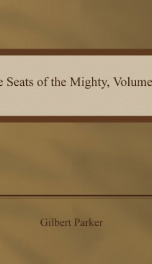The Seats of the Mighty, Volume 3

ARGAND COURNALThe most meagre intelligence came to me from the outer world. Ino longer saw Gabord; he had suddenly been with drawn and a newjailer substituted, and the sentinels outside my door and beneaththe window of my cell refused all information. For months I had nonews whatever of Alixe or of those affairs nearest my heart. Iheard nothing of Doltaire, little of Bigot, and there was no signof Voban.Sometimes I could see my new jailer studying me, if my plans werea puzzle to his brain. At first he used regularly to try the barsof the window, and search the wall as though he thought my devicesmight be found there.Scarrat and Flavelle, the guards at my door, set too high aprice on their favours, and they talked seldom, and then withbrutal jests and ribaldry, of matters in the town which were notvital to me. Yet once or twice, from things they said, I came toknow that all was not well between Bigot and Doltaire on one hand,and Doltaire and the Governor on the other. Doltaire had set theGovernor and the Intendant scheming against him because of hisadherence to the cause of neither, and his power to render theplans of either of no avail when he chose, as in my case.Vaudreuil's vanity was injured, and besides, he counted Doltairetoo strong a friend of Bigot. Bigot, I doubted not, found in MadameCournal's liking for Doltaire all sorts of things of which he neverwould have dreamed; for there is no such potent devilry in thisworld as the jealousy of such a sort of man over a woman whosevanity and cupidity are the springs of her affections. Doltaire'simprisonment in a room of the Intendance was not so mysterious assuggestive. I foresaw a strife, a complication of intrigues, andinternal enmities which would be (as they were) the ruin of NewFrance. I saw, in imagination, the English army at the gates ofQuebec, and those who sat in the seats of the mighty, sworn topersonal enmities--Vaudreuil through vanity, Bigot through cupidity,Doltaire by the innate malice of his nature--sacrificing thecountry; the scarlet body of British power moving down upon adishonoured city, never to take its foot from that sword of Francewhich fell there on the soil of the New World.But there was another factor in the situation which I have notdwelt on before. Over a year earlier, when war was being carriedinto Prussia by Austria and France, and against England, the allyof Prussia, the French Minister of War, D'Argenson, had, by thegrace of La Pompadour, sent General the Marquis de Montcalm toCanada, to protect the colony with a small army. From the first,Montcalm, fiery, impetuous, and honourable, was at variance withVaudreuil, who, though honest himself, had never dared to make openstand against Bigot. When Montcalm came, practically taking themilitary command out of the hands of the Governor, Vaudreuildeveloped a singular jealous spirit against the General. It beganto express itself about the time I was thrown into the citadeldungeon, and I knew from what Alixe had told me, and from thegossip of the soldiers, that there was a more open show ofdisagreement now.The Governor, seeing how ill it was to be at variance with bothMontcalm and Bigot, presently began to covet a reconciliation withthe latter. To this Bigot was by no means averse, for his ownposition had danger. His followers and confederates, Cournal,Marin, Cadet, and Rigaud, were robbing the King with a daring andeffrontery which must ultimately bring disaster. This he knew, butit was his plan to hold on for a time longer, and then to retirebefore the axe fell, with an immense fortune. Therefore, about thetime set for my execution, he began to close with the overtures ofthe Governor, and presently the two formed a confederacy against theMarquis de Montcalm. Into it they tried to draw Doltaire, and weresurprised to find that he stood them off as to anything more thanoutward show of friendliness.Truth was, Doltaire, who had no sord
Info about the book
Author:
Series:
Unknown
ISBN:
0838907695
Rating:
5/5 (2)Your rating:
0/5
Languge:
English
Users who have this book
Users who want this book
What readers are saying
What do you think? Write your own comment on this book!
write a commentif you like The Seats of the Mighty, Volume 3 try:
Other books by this author
Do you want to exchange books? It’s EASY!
Get registered and find other users who want to give their favourite books to good hands!





